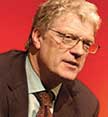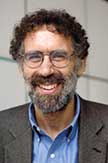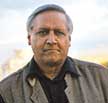Divya Choudary
A couple of years ago, I had the opportunity to attend a TEDx conference in Mumbai. TED stands for Technology, Entertainment, and Design and the conferences bring together entrepreneurs, storytellers, artists, scientists, and visionaries to inspire and share “ideas worth spreading.” I remember leaving the conference feeling dazzled and amazed at the innovative ideas that were shared and the remarkable work the speakers were doing. Since then, I’ve watched a number of TED talks online. Here are a few talks on reimagining education that I really like and want to share with you.
Sir Ken Robinson: Do schools kill creativity?
 By turn entertaining and profoundly moving, author and innovation expert Sir Ken Robinson makes a strong case for creating an education system that nurtures children’s capacities for innovation, imagination and creativity. His contention is that “creativity now is as important in education as literacy, and we should treat it with the same status.” One of my favourite bits of his talk was the story he shared about a 6-year-old in drawing class. When the teacher had asked her what she was drawing she said she was drawing a picture of God. The teacher then said, “But nobody knows what God looks like” and the little girl replied, “They will in a minute.”
By turn entertaining and profoundly moving, author and innovation expert Sir Ken Robinson makes a strong case for creating an education system that nurtures children’s capacities for innovation, imagination and creativity. His contention is that “creativity now is as important in education as literacy, and we should treat it with the same status.” One of my favourite bits of his talk was the story he shared about a 6-year-old in drawing class. When the teacher had asked her what she was drawing she said she was drawing a picture of God. The teacher then said, “But nobody knows what God looks like” and the little girl replied, “They will in a minute.”
Mitch Resnick: Let’s teach kids to code
 When you teach someone a language, you’re not just giving them a skill, you’re giving them the ability to read and learn. You’re also giving them the ability to express themselves and express their ideas. In this digital age, where children spend a lot of their time using the Internet we often tend to think of them as being comfortable or “fluent” with new technologies. Mitch Resnick, of MIT Media Lab, draws a parallel between reading and writing text and using and coding content. Encouraging children to learn to code so that they not only use but are able to create content would enable them to become fluent and thus give them the ability to express themselves creatively, reason systematically, and work collaboratively. The coding software Scratch that Resnick and his team have released makes it simple for children to “learn to code and code to learn.”
When you teach someone a language, you’re not just giving them a skill, you’re giving them the ability to read and learn. You’re also giving them the ability to express themselves and express their ideas. In this digital age, where children spend a lot of their time using the Internet we often tend to think of them as being comfortable or “fluent” with new technologies. Mitch Resnick, of MIT Media Lab, draws a parallel between reading and writing text and using and coding content. Encouraging children to learn to code so that they not only use but are able to create content would enable them to become fluent and thus give them the ability to express themselves creatively, reason systematically, and work collaboratively. The coding software Scratch that Resnick and his team have released makes it simple for children to “learn to code and code to learn.”
Bunker Roy: Learning from a barefoot movement
 He’d like to take us to another world, says Bunker Roy at the start of his TED talk. And he does – to a world where certification matters less than skill, where one is certified not by a paper but by the community that is served, where age and gender hold no bar, where community matters, where people learn to use what they have and to create what they need. Bunker Roy founded the Barefoot College, intended for the poor, in a tiny village in Rajasthan and the work done there has redefined professionalism, brought about dignity of labour and changes so many lives across the world. Listen to his words towards the end of the talk. They are nothing short of illuminating.
He’d like to take us to another world, says Bunker Roy at the start of his TED talk. And he does – to a world where certification matters less than skill, where one is certified not by a paper but by the community that is served, where age and gender hold no bar, where community matters, where people learn to use what they have and to create what they need. Bunker Roy founded the Barefoot College, intended for the poor, in a tiny village in Rajasthan and the work done there has redefined professionalism, brought about dignity of labour and changes so many lives across the world. Listen to his words towards the end of the talk. They are nothing short of illuminating.
Gever Tulley: Life lessons through tinkering
 In his ‘Tinkering School’, Gever Tulley creates for children an environment conducive to building and creative problem solving. “Building is at the heart of the experience,” he says about the school where students are given the time and the tools, materials and guidance to go from doodling to building things like roller coasters! In this school, doing equals success and problems are treated as puzzles. Children learn to trust themselves and others with tools and depend on themselves to figure things out. After this immersive experience, children “leave with a better sense of how to make things”. Also check out his talk on ‘the five dangerous things you should let your kids do’!
In his ‘Tinkering School’, Gever Tulley creates for children an environment conducive to building and creative problem solving. “Building is at the heart of the experience,” he says about the school where students are given the time and the tools, materials and guidance to go from doodling to building things like roller coasters! In this school, doing equals success and problems are treated as puzzles. Children learn to trust themselves and others with tools and depend on themselves to figure things out. After this immersive experience, children “leave with a better sense of how to make things”. Also check out his talk on ‘the five dangerous things you should let your kids do’!
Mae Jemison: Teach arts and sciences together
 In a world that often sees Arts as separate from Sciences, Mae Jemison – astronaut, doctor, art collector and dancer – shows us how these fit together. Through sharing stories from her own life, she draws attention to the fact that “the arts and sciences are avatars of human creativity and are our attempts as humans to build an understanding of the universe and the world around us.” As educators, we need to understand that both arts and the sciences are founded on intuition and logic and we can be artists and academicians. As Jemison says, there is no question of intuitive versus analytical when you need both in life.
In a world that often sees Arts as separate from Sciences, Mae Jemison – astronaut, doctor, art collector and dancer – shows us how these fit together. Through sharing stories from her own life, she draws attention to the fact that “the arts and sciences are avatars of human creativity and are our attempts as humans to build an understanding of the universe and the world around us.” As educators, we need to understand that both arts and the sciences are founded on intuition and logic and we can be artists and academicians. As Jemison says, there is no question of intuitive versus analytical when you need both in life.
The must watch list
1. Stuart Firestein: The Pursuit of Ignorance
2. John Wooden: The Difference Between Winning & Succeeding
3. Arvind Gupta: Turning trash into toys for learning
4. Salman Khan: Let’s use video to reinvent education
5. Dan Meyer: Math Class Needs a Makeover
6. Chimamanda Adichie: The Danger of single Story
7. Sugata Mitra: Build a School in the Cloud
8. Liz Coleman: A call to reinvent liberal arts education
9. Arthur Benjamin: Teach statistics before calculus!
10. Christopher Emdin: Teach teachers how to create magic

















